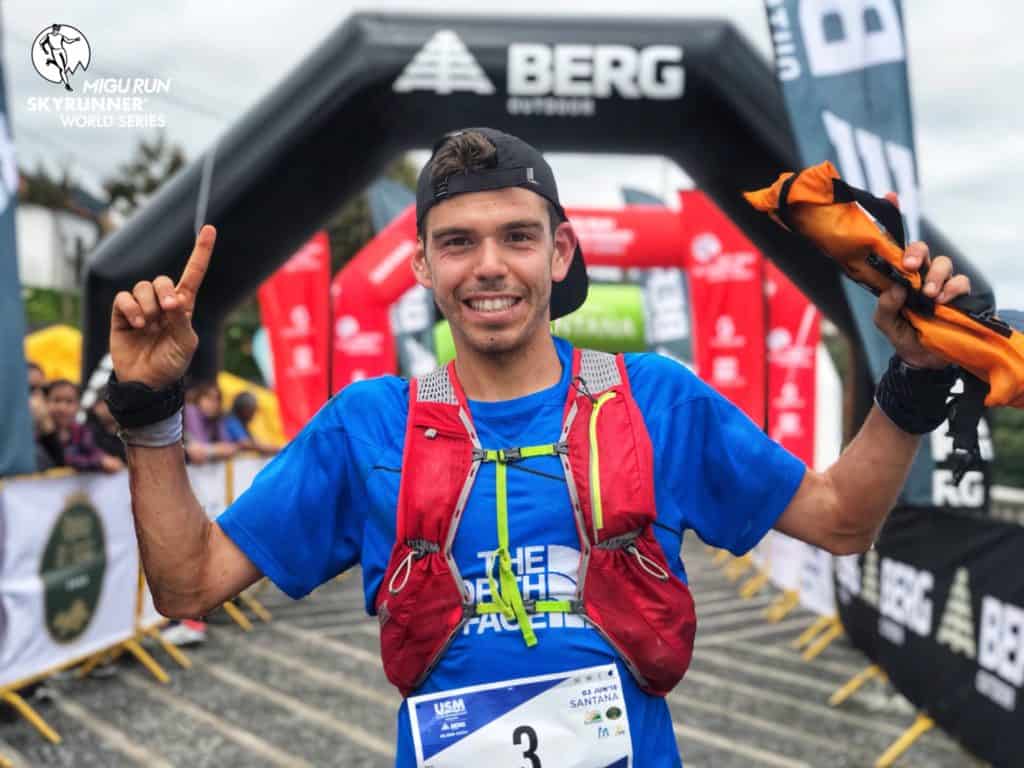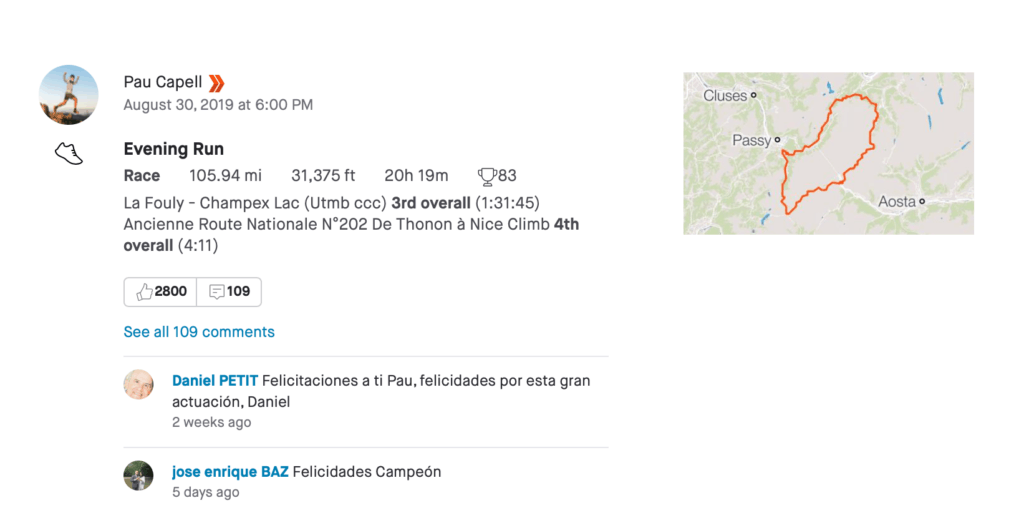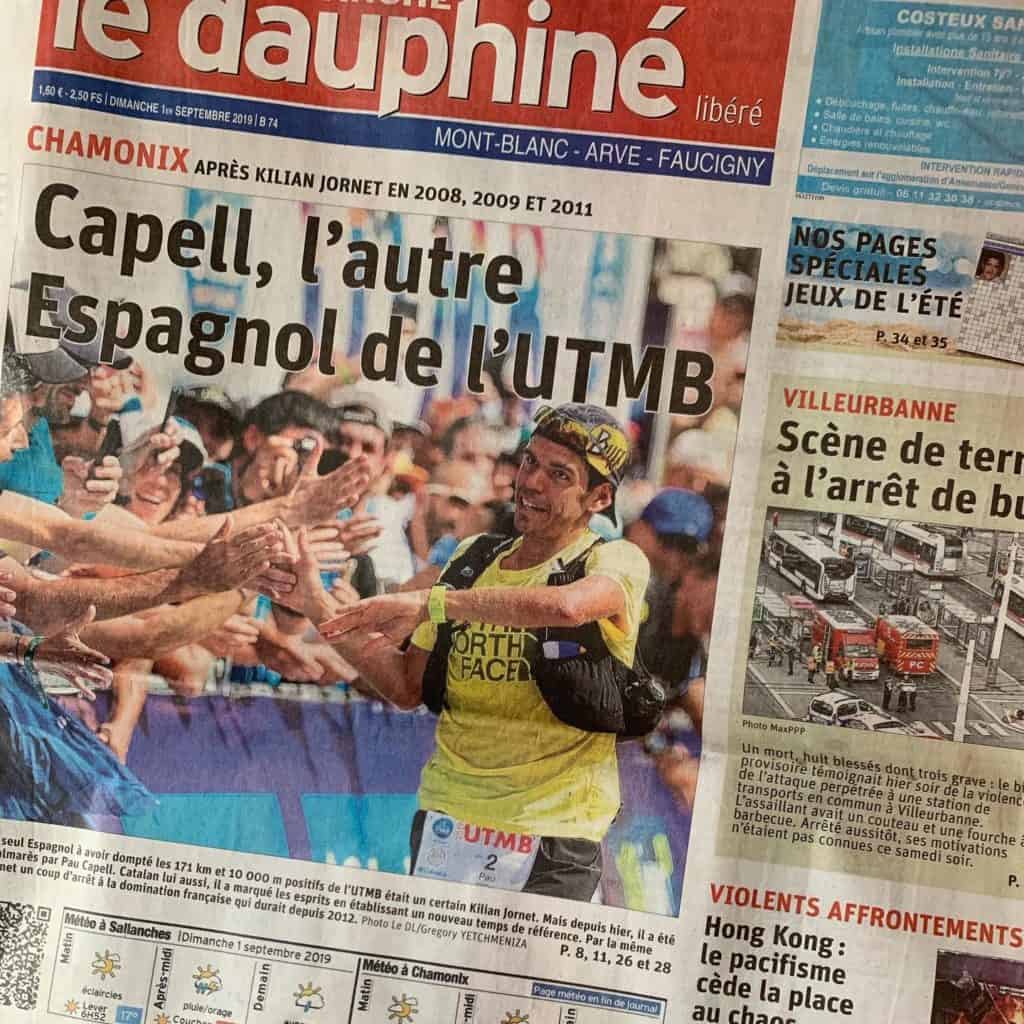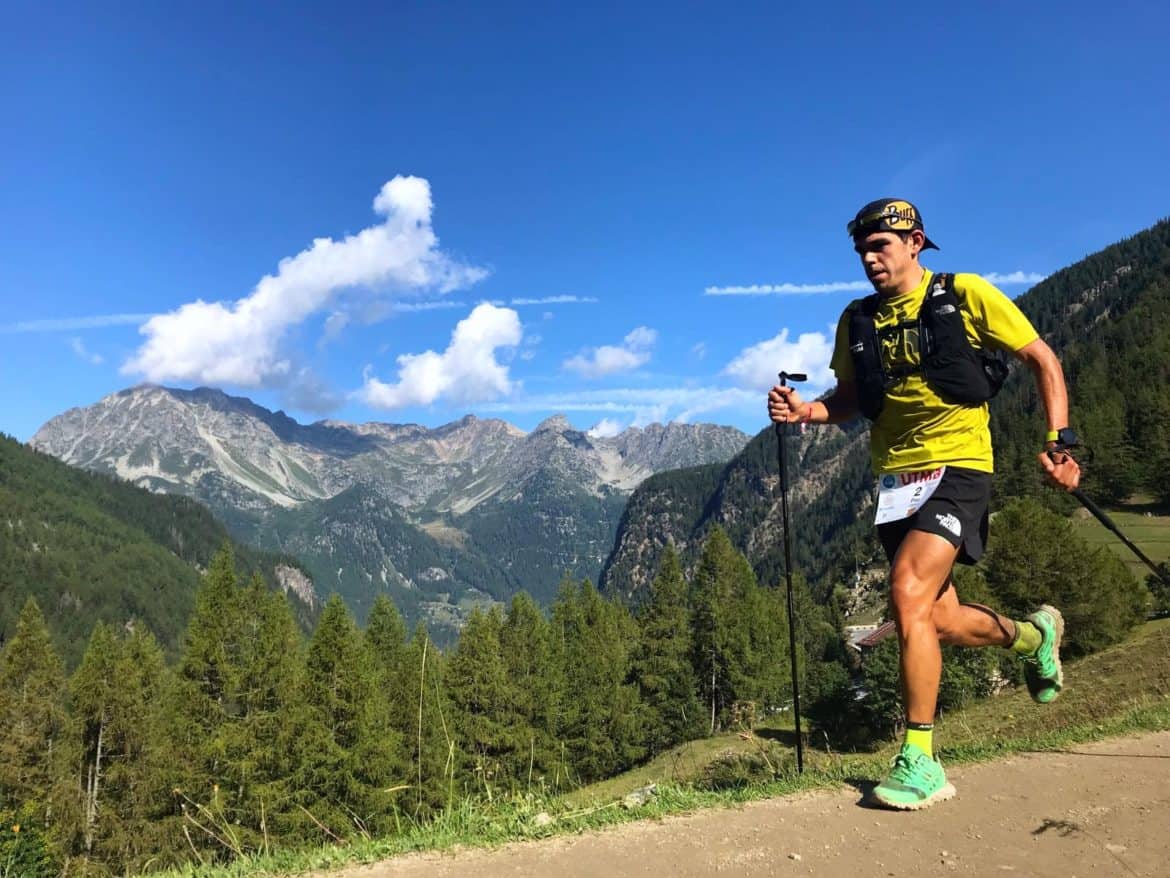What We Know About Pau Capell
by Chase Parnell — October 7, 2019 — Photo: BUFF®
I scoured the internet for hours to dig up everything I could find on Mr. Pau Capell. I watched all the interviews, read all the available content in english, and even utilized Google Translate to read articles written in his native tongue, Spanish. In the end, I uncovered enough to provide a worthwhile look into the life and mind of this emerging superstar and 2019 UTMB champion, Pau Capell.
First off, I have to say that Pau is one charming guy — he comes off as exceptionally genuine and good-natured. He immediately made a fan out of me and I’ll definitely be rooting for him in the future. Honestly, I didn’t know all that much about Pau before writing this article and I don’t get the feeling a lot of your average American ultra runners do either. I knew Pau was killing it at his “local” race, Transgrancanaria, on Spain’s Hawaii, winning multiple years in a row, but in my mind he wasn’t quite on the level of a Kilian, a Francois, or a Xavier. Pau was a bit under the radar. Well, after running away from Xavier and earning his UTMB crown, Pau has officially arrived and it’s time we take a moment to better understand who he is.
Okay, let’s get into it. Pau was born in Sant Boi de Llobregat, a suburb of Barcelona, Spain and he still lives there to this day. Based on my google maps research, I’d designate this area as semi-arid hill country, not exactly primo training grounds for a mountain 100 runner.
Pau grew up playing tennis and soccer, but after a severe knee injury when he was 20 years old and 5 months of essentially no activity, Pau started running to speed along the recovery process. The rest is history. You know who else was originally a soccer player? Galen Rupp. But we won’t go there right now — enter slasher movie music and flashing images of Alberto and sharpened crucifix. Too soon?
Anyways, it’s been just 7 years from the time Pau started running to today. The learning curve did not prove to be too sharp for him. Along with countless lesser wins and top finishes, he’s chalked up the following ultra accolades:
Pau’s Biggest Wins:
- 2016 TDS Champion.
- 2017, 2018, and 2019 Champion of the Ultra Trail TransGrancanaria.
- 2018 Eiger Ultra Trail Champion.
- 2019 Patagonia Trail Run Champion.
- 2019 Mozart 100 Champion.
- 2019 UTMB Champion.
Pau was undefeated on the Ultra Trail World Tour circuit in 2019. Nobody came close to touching him this year. So where did all this come from? What allowed Pau to go from a really good runner to best in the world status? As far as I can tell, two things: dreams and family. On multiple occasions, when asked what his philosophy on life was, he responded that he fights for his dreams and loves his family. He said that we never know what tomorrow will bring, so you have to seize the moment and do the best you possibly can.

In a podcast interview with IRun4Ultra, he took his reliance on his family to a whole other level when he claimed that it’s not the training that helps him win and it’s not the diet — it’s his family. He says that when someone in his family or his girlfriend Marta is not doing well, he’s not doing well. He cannot train. He simply doesn’t have the energy. But when everyone is happy, he is happy, and he can run well.
Pau went on to tell a story about how his girlfriend Marta infiltrated his UTMB music playlist and inserted little motivational clips from his father, his coach, and other people close to him. He’s definitely driven by the heart and you can tell that his family is what keeps him charged and running on full. The North Face UK quoted him as saying, “I love to run alone, but I need to have my family and girlfriend with me in spirit to truly enjoy it.”
As far as the training goes, he works out twice a day, with a running block in the morning, and cross training and weights in the afternoon. He was an engineer by trade before going supersonic and achieving massive success as a professional athlete. He credits his training as an engineer and natural problem-solving mentality as two of his main keys to success. Pau says that early in his running career he would just go out and run 25k-30k every morning but that only worked for so long. He’s had to adapt and adjust his training as he’s learned what works and what doesn’t.
Without constant self-analysis and adjustment, I don’t think you (1) avoid overtraining, (2) nail every race you run for an entire calendar year, and (3) beat the best in the world.
To me, it feels like those who really find success in this sport, and I guess in life generally, are those that finish something difficult and instead of saying, “I’m proud of that effort, I did the best I could”, they say, “I’m proud of that effort, how do I do better next time?” Pau appears to be an expert at this and I doubt that winning UTMB changed that. There are plenty of boxes left to tick.
Without a doubt, Pau is a competitor of the fiercest variety. In the interviews leading up to UTMB this year, he remained humble and full of compliments for Xavier Thevenard and other runners in the field, but there was no doubt that he wanted to win. He let it slip once that he actually surveils the Strava accounts of other top performers to see how their training has been going. He also made a bit of a jovial jab at the American contingent, acknowledging that the Americans are motivated to finally win at UTMB, but that they’d have to come through him first.
During the UTMB race itself, Pau was constantly asking his crew and spectators what his lead on Xavier was down the stretch so as to motivate and will himself to maintain his lead. It’s worth noting that there are other methods out there; Kilian, for example, has been known to wait for fellow competitors at an aid station just so he can have some company during a long race, only to then drop them in the final stages. I don’t believe we’ll see Pau doing that any time soon. So if Kilian is the soft spoken Spaniard who is driven by just being out in the elements and moving light and fast, Pau is the urban version. He’s the kid who grew up in the city idolizing futbolers, found running later in life, and is driven perhaps by victory and family instead of nature and discovering oneself there.
Speaking of Strava, I took a look at Pau’s account. The only activity he posted since January of 2019 was his UTMB win, which is entitled “Evening Run.” Super casual outing. What also stood out was that his first mile at UTMB was 5:51 and his first 5k was 19:15. Sheesh. Absolutely bananas.

When Pau was asked what his favorite type of terrain was to run on, he specifically said he doesn’t like technical downhills or courses that involve ropes … because he gets scared. That comment had me wondering if he considers a course like UTMB to have technical downhills? Or are those Alpen descents buffed out in his mind? I know the Euros have a different perspective, but still, I ran UTMB in 2015 and, sure, there are some runnable sections, but for the most part, it required a high level of engagement, coordination, and lots of staring at the trail looking for rocks, roots, and other objective hazards. I suppose it’s sort of like when my climber friends ask me if I want to “send” a peak and they tell me it’s super chill. If you are a purebred trail runner, don’t ever listen to a climber. They are a different breed and think that because you can run really far, you can also do all the things in the mountains. Not true. “Super chill” to a real climber means like class 5 scrambling that would almost certainly leave me with a warm stream running down my leg. Just keeping it real.
I’d be remiss though if I didn’t mention Pau’s herculean race calendar from 2019. Is it possible that 2019 was both Pau’s arrival to the all-star squad but also his departure? Perhaps, but not likely. When you look at his 2019 season, it’s almost laughable. In America, he would be crucified for racing this much. He’d immediately be compared to the rising stars that skyrocketed onto the scene then epically flamed out due to OTS. For some reason though, I have this sneaky feeling that somehow Pau isn’t overextending himself.
Pau Capell’s 2019 Race Schedule
- Feb — Transgrancanaria 128k
- April — Patagonia Run 170k
- April — Ultra Trail Cerro Rojo (Mexico) 80k
- May — Trail Menorca Cami de Cavalls 185k
- June — Tenerife Bluetrail 42k
- June — Mozart 115k
- July — Glossglockner Ultratrail 87k
- Aug — UTMB 170k
All told, that’s 977k or 607 miles of racing in the span of seven months. This stat has me wondering if the Euros somehow manage the fatigue better than us Americans. Personally, I think it’s not only that Americans leave a lot of their races out on the training grounds but also that we might be consistently more stressed than other global cultures. We are financially very stable but we get there by pushing: GO, GO, GO all the time towards the “American Dream.” We don’t feel settled unless be we are constantly moving towards huge objectives. I’m no sociologist so obviously take that with a grain of salt, but at what point do we sit back and revel in our place in life? Essentially never.

A story to drill this concept home: I once watched an Italian woman, in a restaurant in Ferrara, Italy, eat a chocolate covered strawberry, with a level of satisfaction and enjoyment unknown to my existence here on earth. From the slow closure of the eyes, the sing-song Mmmm’s, the wafting of hands and shaking of head, she taught me in that moment that I’m certainly lacking sensory-induced moments of pleasure. I’m not stopping to smell the roses. Why am I content to scarf down a bland sandwich while driving in my car and talking on the phone? The only pleasure being that my stomach is now full and I don’t have to think about my hunger anymore.
Now this may seem like a reach, but similarly, Americans tend to blast a race, and with fleeting appreciation, we immediately begin to critique ourselves, and then start thinking about the next thing. Where is the enjoyment and gratitude? Why aren’t we in a state of ecstasy after accomplishing our goals? Why so quick to move on from our moment in the sun? Is it possible that this is inhibiting our ability to recover in a sustainable way and release some of that deep fatigue that accumulates after big efforts? It seems that Pau has cracked this code, at least for the time being. Somehow he’s managed to race an obscene amount, win on the biggest stages, celebrate valiantly, and bounce back with unparalleled vigor.
Well, there you have it. That’s what we know about Pau Capell.
Only time will tell if the big three in Jornet, D’Heane, and Thevenard will become the big four. UTMB had to give Pau a huge shot of confidence. He’s young too, only 28 years old! At the very least, he’s definitely made this sport more exciting and there couldn’t be a more deserving, humble, and likable character.
And oh, Pau’s favorite movie is Braveheart. So if you see him on the start line, tread lightly, because out on the course, Mr. Nice Guy might just paint his face and go all William Wallace on your ass.
He’s certainly had one hell of a year.
**Update: Buff USA provided this sick video of Pau’s quick turnaround at the Courmayeur aid station en route to winning the 2019 UTMB. In & out in LESS THAN 3 MINUTES. Hover over our logo and subscribe to our channel!**
If you’re enjoying our content, consider supporting Nikki and I through Patreon! For as little as $2 a month, you can join the crew and help make sure Treeline Journal continues to thrive. If you already are a patron, thank you so much for your support!



2 thoughts on “What We Know About Pau Capell”